Research Support Advent Calendar 2024
By Kirsty, on 29 November 2024
This year we are pleased to share our Advent Calendar of Research Support with you!
We will be posting links every day on our Bluesky account. If you’re not on Bluesky yet, don’t worry — we’ve shared the calendar below for you to view at your own time. We will also keep this post updated throughout the month with an accessible version of the content.
 1 December: On the first day of advent, improve the visibility of your research by updating your UCL public profile, recently revamped with key fields in RPS, including the new UN Sustainable Development Goals section, to align your research with global initiatives.
1 December: On the first day of advent, improve the visibility of your research by updating your UCL public profile, recently revamped with key fields in RPS, including the new UN Sustainable Development Goals section, to align your research with global initiatives.
https://www.ucl.ac.uk/library/open-science-research-support/ucl-profiles/getting-started-your-public-profile
- UCL front quad, looking towards Cruciform, an elegant red brick building. It is dark and the picture is lined with trees with purple and blue lights.
 2 December: Countdown to Christmas with Citizen Science…Join UCL’s first Citizen Science community event on 9 December! Let’s discover, share and network this season. Don’t forget to join our online network too! https://blogs.ucl.ac.uk/open-access/2024/11/13/get-involved-ucls-first-citizen-science-community-event-on-9-december-join-our-online-network/
2 December: Countdown to Christmas with Citizen Science…Join UCL’s first Citizen Science community event on 9 December! Let’s discover, share and network this season. Don’t forget to join our online network too! https://blogs.ucl.ac.uk/open-access/2024/11/13/get-involved-ucls-first-citizen-science-community-event-on-9-december-join-our-online-network/
- Image by Alejandro Salinas Lopez “alperucho” on UCL imagestore. A group of three women in warm clothing toasting with cups of coffee at night.
 3 December: Is Santa’s Christmas naughty or nice list copyrighted? Think of it as research data…Take our Christmas copyright quiz to learn more! https://ucl-global.libwizard.com/f/copyright_Christmas_quiz Image created using Copilot on 22 November
3 December: Is Santa’s Christmas naughty or nice list copyrighted? Think of it as research data…Take our Christmas copyright quiz to learn more! https://ucl-global.libwizard.com/f/copyright_Christmas_quiz Image created using Copilot on 22 November
- Image: cartoon of a copyright symbol with a white beard and Christmas hat.
 4 December: Today we are celebrating the 10 years since the IOE’s merger with UCL. Check out the action on the UCL Press channels.
4 December: Today we are celebrating the 10 years since the IOE’s merger with UCL. Check out the action on the UCL Press channels.
- Image from UCL Press. A perspective shot of the IOE looking up, looks like a stack of big concrete blocks.
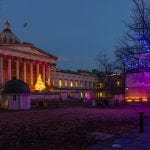 5 December: Learn how to connect your ORCID to UCL’s Research Publications Service (RPS) for up-to-date records and easier #OpenAccess compliance. More info: https://buff.ly/3WALW3s
5 December: Learn how to connect your ORCID to UCL’s Research Publications Service (RPS) for up-to-date records and easier #OpenAccess compliance. More info: https://buff.ly/3WALW3s
- Image by Mary Hinkley on UCL imagestore. UCL front quad at twilight. In front of the portico is a Christmas tree decorated with yellow lights. To the right of the image is a leafless tree decorated with purple and pink lights which can be seen reflecting off the white building beyond.
 6 December: Tis the season…for data management planning!
6 December: Tis the season…for data management planning!
https://www.ucl.ac.uk/library/open-science-research-support/research-data-management/policies/managing-data-across-research
- Image by Alejandro Salinas Lopez “alperucho” on UCL imagestore. Image shows a Christmas garland over and arch with people walking through, slightly out of focus. The garland is threaded with yellow lights and the words Happy Holiday Season are written in pink lights.
 7 December: Ever wondered if your publications are being cited in policy documents, and where? With policy and grey literature databases like Overton, you can discover who is citing your work and how it’s influencing decision-making documents. https://library-guides.ucl.ac.uk/research-metrics/overton
7 December: Ever wondered if your publications are being cited in policy documents, and where? With policy and grey literature databases like Overton, you can discover who is citing your work and how it’s influencing decision-making documents. https://library-guides.ucl.ac.uk/research-metrics/overton
- Image by Mat Wright on UCL imagestore. A girl with dark hair and wire rimmed glasses wearing a yellow jumper sits at a laptop. In the background can be seen colourful book stacks.
 8 December: Explore this year’s Open Science Conference collections available on UCL’s Media Central and Research Data Repository! Access talks, posters, and insights from UCL researchers advancing open science, and share in the wealth of knowledge supporting our open research community.
8 December: Explore this year’s Open Science Conference collections available on UCL’s Media Central and Research Data Repository! Access talks, posters, and insights from UCL researchers advancing open science, and share in the wealth of knowledge supporting our open research community.
https://blogs.ucl.ac.uk/open-access/2024/07/11/from-policy-to-practice-ucl-open-science-conference-2024/
- Image by John Moloney on UCL imagestore. A group of people in business attire socialising with drinks. Picture is taken from a distance and slightly above.
 9 December: Early Christmas Present?.. Yes please! Learn more about archiving your research outputs using the UCL Research Data Repository: https://www.ucl.ac.uk/library/open-science-research-support/research-data-management/ucl-research-data-repository
9 December: Early Christmas Present?.. Yes please! Learn more about archiving your research outputs using the UCL Research Data Repository: https://www.ucl.ac.uk/library/open-science-research-support/research-data-management/ucl-research-data-repository
- Image by UCL Media Services on UCL imagestore. A close up of a bright purple bauble on a tree with some blue lights.
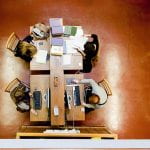 10 December: What did the copyright support team bring you this year? Read our Christmas blog!
10 December: What did the copyright support team bring you this year? Read our Christmas blog!
https://blogs.ucl.ac.uk/copyright/2024/12/02/the-twelve-gifts-of-copyright/
- Image by Tony Slade from UCL imagestore. A top-down photograph of four students working individually at wooden desks. To the right of the image are wooden bookcases full of colourful books.
 11 December: It’s UK Disability History Month (14 Nov – 20 Dec)! Take this opportunity to learn about the UCL Digital Accessibility team’s work to make research and resources more inclusive. Catch up on our profile with Ben Watson, leading the way on digital accessibility at UCL!
11 December: It’s UK Disability History Month (14 Nov – 20 Dec)! Take this opportunity to learn about the UCL Digital Accessibility team’s work to make research and resources more inclusive. Catch up on our profile with Ben Watson, leading the way on digital accessibility at UCL!
https://blogs.ucl.ac.uk/open-access/2024/07/08/spotlight-on-ben-watson-champion-of-digital-accessibility-at-ucl/
 12 December: Preprints as a way to share your initial findings to influence decision-makers: https://blogs.ucl.ac.uk/open-access/2020/11/06/case-study-disseminating-early-research-findings-to-influnce-decision-makers/
12 December: Preprints as a way to share your initial findings to influence decision-makers: https://blogs.ucl.ac.uk/open-access/2020/11/06/case-study-disseminating-early-research-findings-to-influnce-decision-makers/
- Image by Tony Slade on UCL imagestore. A close-up perspective shot of a bookcase. Black books with gold writing are in the foreground and red, orange and blue volumes are further back.
 13 December: Want to learn how UCL Press is committed to providing free, high-quality educational resources to support students and educators globally? Read Dhara Snowden’s blog on how #OpenAccess textbooks are reshaping the future of learning and education! https://blogs.ucl.ac.uk/open-access/2024/10/23/oa-textbooks-ucl-press-perspective/
13 December: Want to learn how UCL Press is committed to providing free, high-quality educational resources to support students and educators globally? Read Dhara Snowden’s blog on how #OpenAccess textbooks are reshaping the future of learning and education! https://blogs.ucl.ac.uk/open-access/2024/10/23/oa-textbooks-ucl-press-perspective/
- Image by Alejandro Salinas Lopez “alperucho” on UCL imagestore. A plate of mince pies.
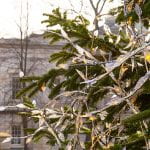 14 December: This holiday season, we’re celebrating meaningful partnerships between researchers and the public with the Principles for Citizen Science at UCL. The principles ensure that projects involving citizen scientists are inclusive, ethical, and impactful – a perfect recipe for success!
14 December: This holiday season, we’re celebrating meaningful partnerships between researchers and the public with the Principles for Citizen Science at UCL. The principles ensure that projects involving citizen scientists are inclusive, ethical, and impactful – a perfect recipe for success!
- Image by Mary Hinkley on UCL imagestore. A close up of a Christmas tree covered in yellow lights and small silver leaves. In the background can be seen a grey building, some leafless trees and a dark grey statue of a man.
 15 December: An RDM film recommendation – Coded Bias (Netflix)- When MIT Media Lab researcher Joy Buolamwini discovers that many facial recognition technologies misclassify women and darker-skinned faces, she delves into an investigation of widespread bias in algorithms. https://youtu.be/_84k600_6bg?feature=shared
15 December: An RDM film recommendation – Coded Bias (Netflix)- When MIT Media Lab researcher Joy Buolamwini discovers that many facial recognition technologies misclassify women and darker-skinned faces, she delves into an investigation of widespread bias in algorithms. https://youtu.be/_84k600_6bg?feature=shared
- Image by Alejandro Salinas Lopez “alperucho” on UCL imagestore. An arm and hand in profile holds up a mobile phone with the camera open. The phone shows the UCL portico and Christmas tree. The background is out of focus but appears to show Christmas lights.
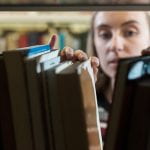 16 December: Creative Commons licences embrace the spirit of Christmas. Learn how they work: https://blogs.ucl.ac.uk/open-access/2023/10/23/how-creative-commons-licences-support-open-scholarship/
16 December: Creative Commons licences embrace the spirit of Christmas. Learn how they work: https://blogs.ucl.ac.uk/open-access/2023/10/23/how-creative-commons-licences-support-open-scholarship/
- Image by James Tye on UCL imagestore. Image shows a view through a gap in books to a woman with light brown hair holding the books open and appearing to be searching the shelf.
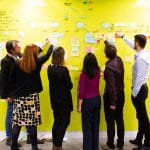 17 December: Earlier this year, we introduced the UCL Statement on Principles of Authorship, created through community consultation and co-creation. This document is designed to promote more equitable and transparent authorship practices across UCL. Learn more: https://blogs.ucl.ac.uk/open-access/2024/10/25/announcing-ucl-statement-on-principles-of-authorship/
17 December: Earlier this year, we introduced the UCL Statement on Principles of Authorship, created through community consultation and co-creation. This document is designed to promote more equitable and transparent authorship practices across UCL. Learn more: https://blogs.ucl.ac.uk/open-access/2024/10/25/announcing-ucl-statement-on-principles-of-authorship/
- Image by Alejandro Walter Salinas Lopez on UCL imagestore. Six people in office attire facing a bright yellow wall covered in postit notes
 18 December: Have you ever questioned which university ranks highest for collaboration or open access? Explore the Leiden University Rankings, based exclusively on publication data, to find the answer. https://www.leidenranking.com/ranking/2024/list
18 December: Have you ever questioned which university ranks highest for collaboration or open access? Explore the Leiden University Rankings, based exclusively on publication data, to find the answer. https://www.leidenranking.com/ranking/2024/list
- Image by Mat Wright on UCL imagestore. A student with long blonde hair studies in the foreground. Behind her are rows of wooden desks and book stacks in arches sit further back.
 19 December: UCL Press Play: Check out the new podcast series from @uclpress.bsky.social hosted by Philip Schofield (UCL’s Bentham Project). Join UCL experts as they explore Jeremy Bentham’s legacy, covering utilitarianism, queer aesthetics, historical views on non-binary diversity, and more. Listen now: shorturl.at/Nvqzl
19 December: UCL Press Play: Check out the new podcast series from @uclpress.bsky.social hosted by Philip Schofield (UCL’s Bentham Project). Join UCL experts as they explore Jeremy Bentham’s legacy, covering utilitarianism, queer aesthetics, historical views on non-binary diversity, and more. Listen now: shorturl.at/Nvqzl
- Image by KamranAydinov on Freepik. Blue headphones surrounded by christmas decorations, stockings, candles, tree lights and pine cones.
 20 December: Ever hit a paywall when trying to access scholarly publications? Get the popcorn ready, and be prepared to have your eyes opened by watching this documentary ‘Paywall: the Business of Scholarship’ at https://paywallthemovie.com/ #OpenAccess #ResearchSupportAdvent
20 December: Ever hit a paywall when trying to access scholarly publications? Get the popcorn ready, and be prepared to have your eyes opened by watching this documentary ‘Paywall: the Business of Scholarship’ at https://paywallthemovie.com/ #OpenAccess #ResearchSupportAdvent
- Image by Mary Hinkley on UCL imagestore. A mixed group of people around a table working at laptops.
 21 December: An RDM stocking filler – Research Data MANTRA training – up your RDM skills with this external online course: https://mantra.ed.ac.uk/
21 December: An RDM stocking filler – Research Data MANTRA training – up your RDM skills with this external online course: https://mantra.ed.ac.uk/
- Image by Mary Hinkley on UCL imagestore. Two large and several small icicles against a wintery sky.
 22 December: UCL staff and students: join our new Copyright Literacy Community on Teams!
22 December: UCL staff and students: join our new Copyright Literacy Community on Teams!
- Image by KamranAydinov on Freepik. Top view of hand holding a pen on spiral notebook with new year writing and drawings decoration accessories on black background.
 23 December: Interested in discovering which UCL department or faculty collaborates most with yours, or identifying the most common research theme in your department? Explore the My Organisation data in InCites to uncover trends for your department or faculty. https://library-guides.ucl.ac.uk/web-of-science/incites
23 December: Interested in discovering which UCL department or faculty collaborates most with yours, or identifying the most common research theme in your department? Explore the My Organisation data in InCites to uncover trends for your department or faculty. https://library-guides.ucl.ac.uk/web-of-science/incites
- Image by Alejandro Salinas Lopez “alperucho” on UCL imagestore. A Christmas tree with white lights at night in front of columns lit with colours of the rainbow.
 24 December: From all the team here at the UCL Office for Open Science & Scholarship we want to thank you all for your collaboration and interaction this year, and wish you all a great break! We’ll be back after 6th January!
24 December: From all the team here at the UCL Office for Open Science & Scholarship we want to thank you all for your collaboration and interaction this year, and wish you all a great break! We’ll be back after 6th January!
- UCL portico in the background lit up in white at twilight. In the foreground and to either side trees are lit in a variety of rainbow colours.
 Close
Close















